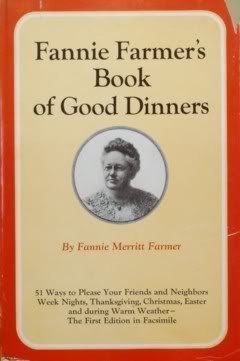by Fannie Farmer (1972 reprint 1914)
Come home, America!
For every person interested in good, wholesome food here is an original, unadulterated, American-as-apple-pie cookbook. Fannie Farmer published it in 1905, well before the age of instant mixes, food substitutes and frozen
dinners. It is again a fresh and useful cookbook.
Five hundred and fifty-one recipes are included, and each one of them is measured in the expert way that was
Miss Farmer's hallmark. She provides some fancy dishes for festive occasions (quail, Epicurean style; Canton mousse; bouchees of lambs' sweetbreads), but 90 per cent of the recipes call for little in the way of special ingredients or extra time in the kitchen. Some of them have a most contemporary ring- health food bread sandwiches, brown bread sandwiches, flageolets, homemade strawberry ice cream, watercress salad.
No change has been made in this new edition; no change was necessary. A table of measures and weights is included as well as a most complete index to the individual dishes. Within the text, these are grouped into 51 menus
for "Family Dinners, "Dinners for Occasions" (Thanksgiving, Christmas, Lent, Easter, Warm Weather and Emergency), and "Company and Formal Dinners." These are carefully composed, imaginative menus which may be followed in whole or in part.
Fannie Farmer's Book of Good Dinners is a classic cookbook written, in the author's words, "For My Friend.' Just who was this special person remains to this day a mystery, but, fortunately, the original volume is no longer an out-of-print secret Here is Grandmother's cooking as it was-and can be again. Try the apple dumplings or the sponge cake or the lemon cream sherbet or stuffed tomato salad with boiled salad dressing-or any one of 547 other unrevised, timeless recipes.
About the Author
Fannie Merritt Farmer (1857-1915) published the first edition of the Boston Cooking Scbool Cook Book (now
Tbe Fannie Farmer Cookbook) in 1896. From 1891 until 1902 she served as director of the Boston Cooking School
and then opened her own establishment, Miss Farmer's School of Cookery. According to a writer of the time, she was "a practical, womanly woman, strong man to work and fight, deeply with many of the strong points of a impressed with the importance of lifting cookery to its rightful place of dignity as a science woman unsparing of labor, who
and an art, a thought little of herself, a woman so was really in spite of herself."' generous in giving that what she had.
The Pyne Press



